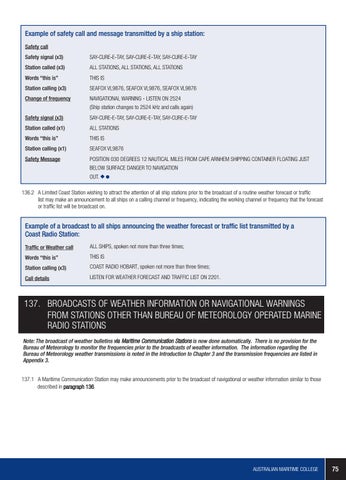Example of safety call and message transmitted by a ship station: Safety call Safety signal (x3)
SAY-CURE-E-TAY, SAY-CURE-E-TAY, SAY-CURE-E-TAY
Station called (x3)
ALL STATIONS, ALL STATIONS, ALL STATIONS
Words “this is”
THIS IS
Station calling (x3)
SEAFOX VL9876, SEAFOX VL9876, SEAFOX VL9876
Change of frequency
NAVIGATIONAL WARNING - LISTEN ON 2524 (Ship station changes to 2524 kHz and calls again)
Safety signal (x3)
SAY-CURE-E-TAY, SAY-CURE-E-TAY, SAY-CURE-E-TAY
Station called (x1)
ALL STATIONS
Words “this is”
THIS IS
Station calling (x1)
SEAFOX VL9876
Safety Message POSITION 030 DEGREES 12 NAUTICAL MILES FROM CAPE ARNHEM SHIPPING CONTAINER FLOATING JUST BELOW SURFACE DANGER TO NAVIGATION OUT. 136.2 A Limited Coast Station wishing to attract the attention of all ship stations prior to the broadcast of a routine weather forecast or traffic list may make an announcement to all ships on a calling channel or frequency, indicating the working channel or frequency that the forecast or traffic list will be broadcast on.
Example of a broadcast to all ships announcing the weather forecast or traffic list transmitted by a Coast Radio Station: Traffic or Weather call
ALL SHIPS, spoken not more than three times;
Words “this is”
THIS IS
Station calling (x3)
COAST RADIO HOBART, spoken not more than three times;
Call details
LISTEN FOR WEATHER FORECAST AND TRAFFIC LIST ON 2201.
137. BROADCASTS OF WEATHER INFORMATION OR NAVIGATIONAL WARNINGS FROM STATIONS OTHeR THAN BUReAU OF MeTeOROLOGY OPeRATeD MARINe RADIO STATIONS note: The broadcast of weather bulletins via Maritime Communication Stations is now done automatically. There is no provision for the Bureau of Meteorology to monitor the frequencies prior to the broadcasts of weather information. The information regarding the Bureau of Meteorology weather transmissions is noted in the Introduction to Chapter 3 and the transmission frequencies are listed in Appendix 3. 137.1 A Maritime Communication Station may make announcements prior to the broadcast of navigational or weather information similar to those described in paragraph 136.
AUSTRALIAN MARITIME COLLEGE
75
